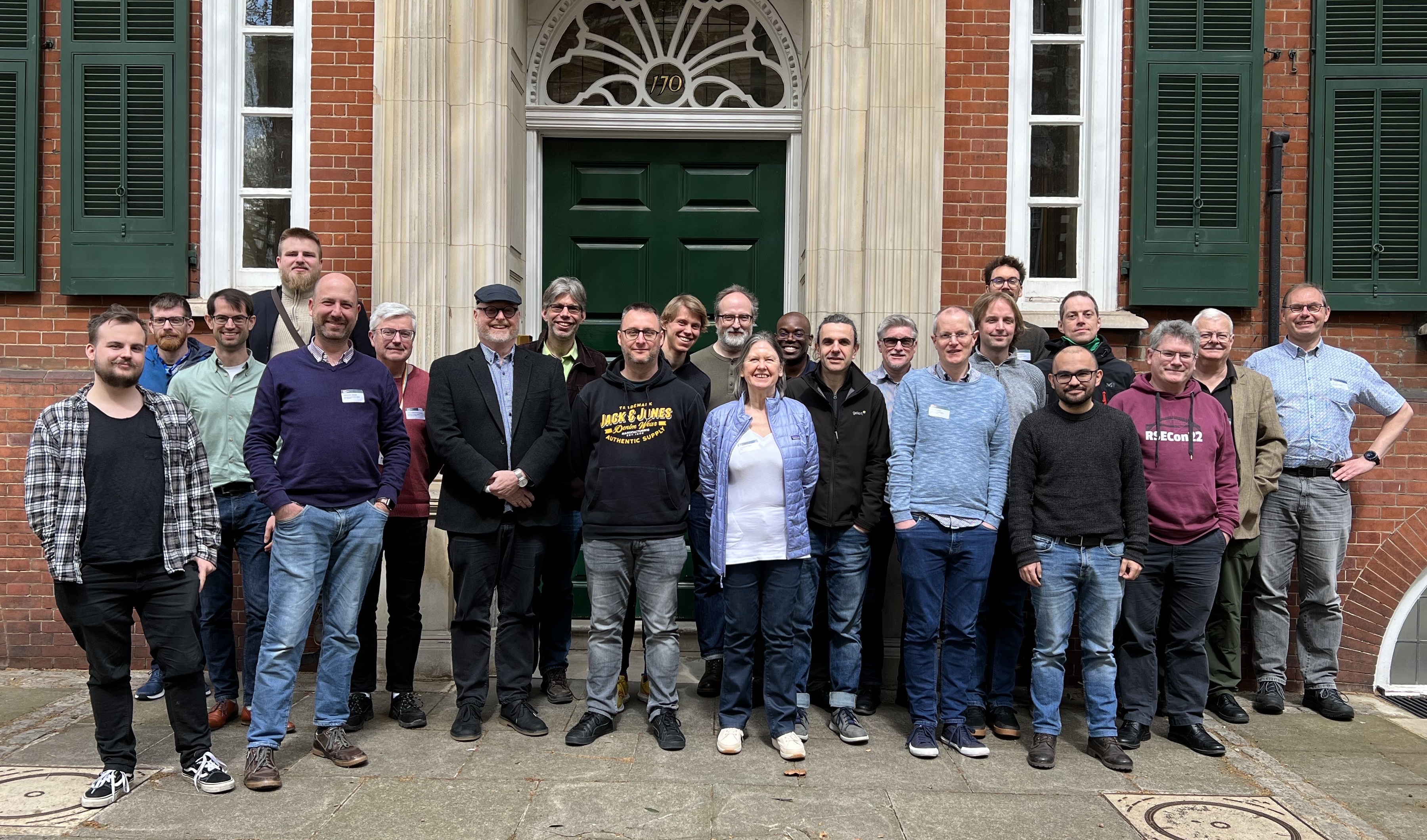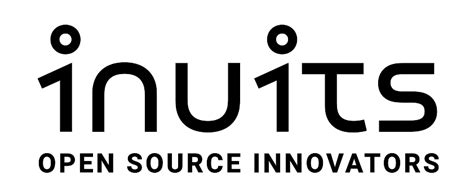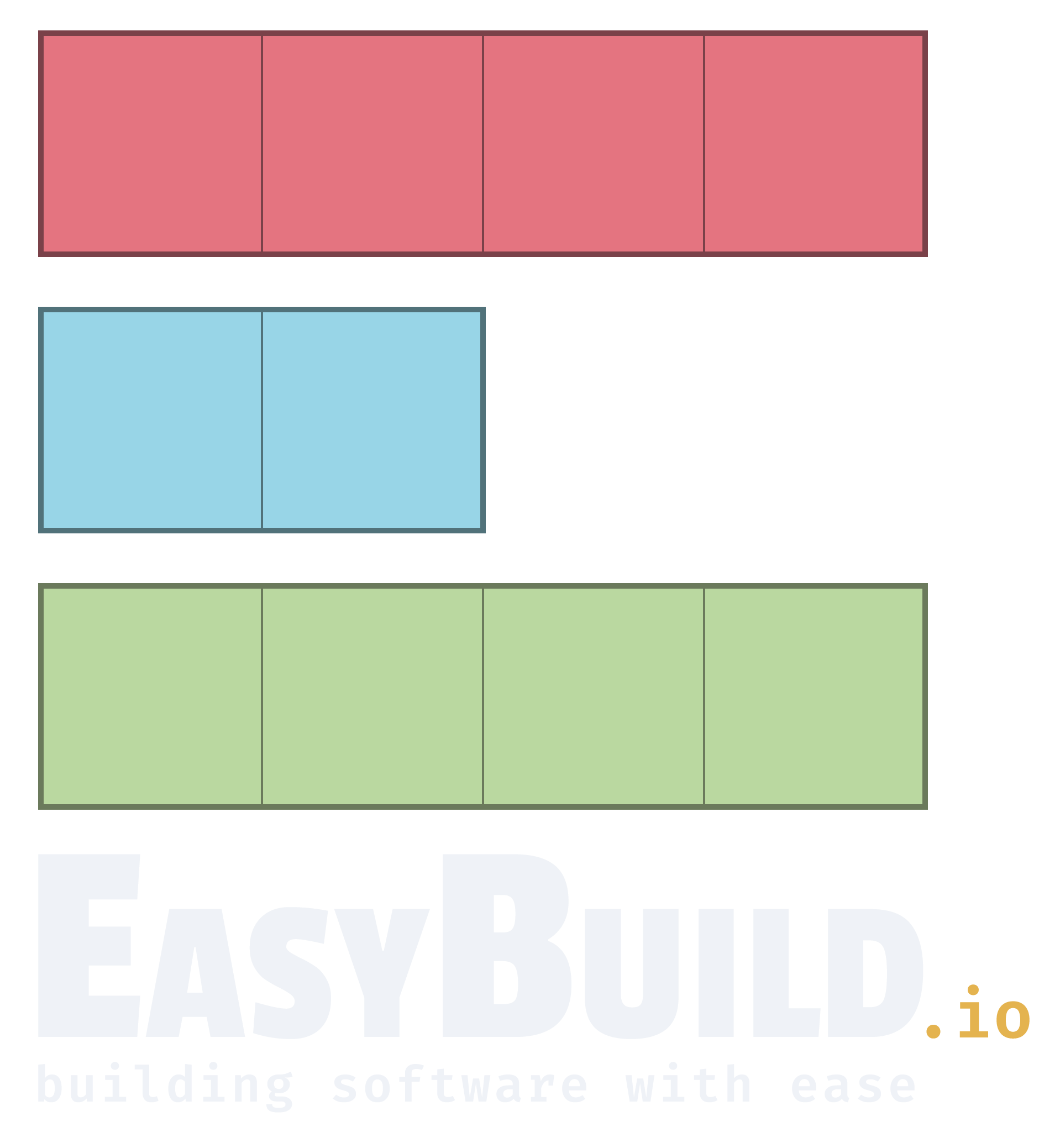8th EasyBuild User Meeting
24-26 April 2023 @ London, UK

(group picture from 8th EasyBuild User Meeting in London - April 2023)
Practical info - Registration - Organisation - Program - Sponsors - Contact
EasyBuild is a software build and installation framework that allows you to manage (scientific) software on High Performance Computing (HPC) systems in an efficient way.
The EasyBuild User Meeting is an open and highly interactive event that provides a great opportunity to meet fellow EasyBuild enthusiasts, discuss related topics, and learn about new aspects of the tool.
It is intended for people that are already familiar with EasyBuild, ranging from occasional users to EasyBuild core developers, maintainers, and experts. Topics will be less introductory in nature than during other EasyBuild events that have been organized in the past.
The program includes presentations by both EasyBuild users and developers, as well as talks about open source projects relevant to the EasyBuild community.
Practical information
The 8th EasyBuild User Meeting will be held Mon-Wed 24-26 April 2023 in London (UK).
The venue is The Council Room at 170's Queens Gate (Imperial College London).
This is an open meeting, anybody interested is welcome to join.
Attendance is free of cost, but registration is required (see below).
Recommended hotels
The following hotels are recommended by Imperial College:- Park International Hotel(~10 min. walk to venue)
- Bailey's Hotel London Kensington (~10 min. walk to venue)
- Queen’s Gate Hotel (1 min. walk to venue)
Zoom & YouTube
We intend to provide live streaming of all presentations that are part of the EUM'23 agenda, via Zoom and the EasyBuild YouTube channel.
Remote attendees will be able to join Zoom sessions for interactive discussions with the speakers.
Note that only registered attendees will have access to the Zoom sessions!
We also intend to record all sessions, and will make the recordings available shortly after the live presentations, via the EasyBuild YouTube channel.
Q&A via #eum channel in EasyBuild Slack
Remote attendees will be ale to submit questions via the #eum channel in the EasyBuild Slack. Comments in YouTube will be disabled for the live streaming events.
If you are not logged in to the EasyBuild Slack yet, you can request an invitation to join via https://easybuild.io/join-slack.
Registration
If you plan to attend one or more presentations, you must register. Seats are limited.
Although attendance is free and open to anyone, having a good view on how well the different sessions will be attended is important for us to be well prepared.
To register your attendance, please visit:
https://event.ugent.be/registration/eum23
Updates and practical information will be sent via email to anyone who registered.
Registration for on-site attendees has been closed since Monday 3 April 2023.
You can now only register to attend remotely - until Friday 21 April 2023.
Organisation
- Jörg Saßmannshausen (Imperial College London, UK)
- Simon Branford (University of Birmingham, UK)
- Jasper Grimm (University of York, UK)
- Adam Huffman (Big Data Institute, Oxford, UK)
- Alan O'Cais (CECAM)
- Kenneth Hoste (HPC-UGent, Belgium)
Program
The 8th EasyBuild User Meeting consists of 3 days of presentations and hands-on sessions.
Please note that all times are in British Summer Time (BST, equivalent to UTC+1)!
We intentionally left ample time in between talks to allow for Q&A, interactive discussions, switching between speakers and breaks.
Useful links:
Overview
(subject to change!)
- Mon 24 April 2023
- [Mon 10:00-12:00 BST - on-site] Welcome (informal)
- (lunch break)
- [Mon 13:00-14:00 BST - on-site] Keynote talk Emerging Technologies and Silicon for HPC: Not all Cores are Equal Ian Cutress (@TechTechPotato - More Than Moore)
- [Mon 14:00-15:00 BST - on-site] EasyBuild State of the Union Kenneth Hoste (HPC-UGent)
- (coffee break)
- [Mon 15:30-16:00 BST - on-site] The Challenges of Installing Software on HPC Systems Santiago Lacalle Puig (Imperial College London)
- [Mon 16:00-16:45 BST - remote] Recent advances in ReFrame Theofilos Manitaras (CSCS) + Vasileios Karakasis (NVIDIA)
- [Mon 16:45-17:30 BST - on-site] EasyBuild 5.0 roadmap Simon Branford (University of Birmingham)
- [Mon 17:30-18:00 BST - remote] The hpc.social Project: Communication Resources for the High Performance Computing Community and Related Fields Alan Sill (TTU) + Vanessa Sochat (LLNL)
- [Mon 18:00-18:15 BST - on-site] HPCNow! and EasyBuild HPCNow! (Danilo Gonzalez)
- [Mon 19:00 BST] (group dinner)
- Tue 25 April 2023
- [Tue 09:00-10:00 BST - on-site] Welcome (informal)
- [Tue 10:00-10:45 BST - on-site] Site presentation: Digital Research Alliance of Canada - Lessons learned, new developments Bart Oldeman (McGill University, Digital Research Alliance of Canada, Calcul Québec)
- [Tue 10:45-11:30 BST - on-site] EESSI: status update Caspar van Leeuwen (SURF)
- [Tue 11:30-12:00 BST - remote] AOMP: OpenMP Target Offloading for AMD GPUs Jan-Patrick Lehr (AMD)
- (lunch break)
- [Tue 13:00-13:30 BST - on-site] Reap the benefits of heterogeneous computing with SYCL Chris Edsall (University of Cambridge)
- [Tue 13:30-14:00 BST - on-site] BEAR Portal Apps: Open OnDemand interactive applications at University of Birmingham James Carpenter (University of Birmingham)
- [Tue 14:00-14:30 BST - on-site] Don't Panic! Mostly Harmless Docs on Creating Easyconfigs Denis Krišťák and Filip Kružík (INUITS)
- [Tue 14:30-15:00 BST - remote] Spack update Todd Gamblin (Lawrence Livermore National Laboratory)
- (coffee break)
- [Tue 15:30-16:15 BST - on-site] EasyBuild on LUMI one year later: Successes and frustrations Kurt Lust (University of Antwerp, LUMI User Support Team)
- [Tue 16:15-17:30 BST - on-site] Best Practices for EasyBuild contributors Sam Moors (Vrije Universiteit Brussel, Belgium)
- [Tue 19:00 BST] (group dinner)
- Wed 26 April 2023
- [Wed 09:00-10:00 BST - on-site] Welcome (informal)
- [Wed 10:00-11:00 BST - on-site] Keynote talk Performance of Community Codes on Multi-core Processors Martyn Guest (Cardiff University)
- [Wed 11:00-11:30 BST - on-site] EasyBuild @ Fred Hutch + Extending R and Python with easy_update + Using containers for building software John Dey (Fred Hutch Cancer Center)
- [Wed 11:30-12:00 BST - on-site] User experience with EasyBuild deploying Health-GPS Microsimulation to Imperial HPC Israel Vieira (Imperial College London)
- (lunch break)
- [Wed 13:00-14:00 BST - remote] So you want to implement a bug fix or feature in EasyBuild framework... Alex Domingo (Vrije Universiteit Brussel, Belgium)
- [Wed 14:00-15:00 BST - on-site] Open (guided) discussion on EasyBuild/EESSI
- [Wed 15:00 BST - on-site] (social event)
[Mon 24 Jan 2023 - 10:00-12:00 BST - on-site]
Welcome to the 8th EasyBuild User Meeting (EUM'23)
Informal welcome session, coffee/tea/cookies will be available.
[Mon 24 April 2023 - 13:00-14:00 BST - on-site]
Keynote: Emerging Technologies and Silicon for HPC: Not all Cores are Equal
by Ian Cutress (@TechTechPotato - More Than Moore)
[recording @ YouTube
- slides, PDF]
The HPC community is very well versed in CPU technology, or what happens when you connect a lot of GPUs in world class supercomputers. What if I told you there is another way? In this presentation we're going to cover a new breed of hardware that both fights traditional HPC but also looks to help accelerate it, mostly from the world of machine learning. Not only are the big players getting involved, but dozens of smaller startups are taping out hardware designed to accelerate anything from matrix-multiplications to standard stencil compute. There's also the realm of Quantum and Analog/Optical compute to discuss, and whether reduced precision is a practical way to approach HPC.
[Mon 24 April 2023 - 14:00-15:00 BST - on-site]
EasyBuild State of the Union
by Kenneth Hoste (HPC-UGent, Belgium)
[recording @ YouTube
- slides, PDF]
Let's look back at what was changed in EasyBuild in the last year, how we are doing right now, what we are currently working on, which challenges are ahead, and the enhancements and changes in EasyBuild we envision for the future.
In addition, the highlights of the last EasyBuild User Survey will be covered in this talk.
[Mon 24 April 2023 - 15:30-16:00 BST - on-site]
The Challenges of Installing Software on HPC Systems
by Santiago Lacalle Puig (Imperial College London)
[recording @ YouTube
- slides, PDF]
The installation of software on high-performance computing (HPC) clusters can present significant challenges. The process of installation differs significantly from that of a personal laptops or workstations, with HPC systems being more intricate and complex than many computing environments. Additionally, HPC clusters are expected to deliver optimal performance and offer a broad range of software choices to meet the requirements of researchers.
This talk will look at some of these challenges as well as how EasyBuild has facilitated and improved the overall workflow of installing software in Imperial College's HPC systems.
[Mon 24 April 2023 - 16:00-16:45 BST - remote]
Recent advances in ReFrame - getting the most out of the recent framework features
by Theofilos Manitaras (CSCS) and Vasileios Karakasis (NVIDIA)
[recording @ YouTube
- slides part 1 + part 2, PDF]
ReFrame is a flexible testing framework for writing systems integration and regression tests, as well as benchmarks. The main focus of the framework is to facilitate writing tests for HPC systems, but its use can be expanded easily to non-HPC systems as well.
In this talk, we will give an update on the recent developments in the framework since last year, present new features and use cases, as well as outline the future outlook. More specifically, we will give a detailed overview of what has changed in 4.0, we will revisit some of the most important pre-4.0 features, such as the new feature-based syntax of `valid_systems` and `valid_prog_environs` that allow users to decouple completely the tests from specific systems and/or environments, the generation of dynamic configurations for use in containerized environments and more. Finally, we will also show how users can leverage the `make_test()` internal function to dynamically generate tests based on a high-level domain-specific specification.
[Mon 24 April 2023 - 16:45-17:30 BST - on-site]
EasyBuild 5.0 roadmap
by Simon Branford (University of Birmingham, UK)
[recording @ YouTube
- slides, PDF]
In 2023 we are planning to release EasyBuild 5. Here we'll highlight the enhancements we are planning to make and give information on the changes you can expect. We'll also discuss how you can help us to develop and test the new EasyBuild version.
[Mon 24 April 2023 - 17:30-18:00 BST - remote]
The hpc.social Project: Communication Resources for the High Performance Computing Community and Related Fields
by Alan Sill (Texas Tech University, US) and Vanessa Sochat (Lawrence Livermore National Laboratory, US)
[recording @ YouTube
- slides, PDF]
This talk will cover the history of the hpc.social resource collection from its initial motivations stemming from general questions and concerns about HPC as a field and community to the recent acceleration of work inspired limitations and issues with existing social media. Using the results of a community survey, the set of services has grown from our first project to create a Mastodon server (https://mast.hpc.social/) to include other chat-oriented media (Slack and Discord) to a wide variety of services added by community request. These include a community map to allow people to tag their locations and those of their HPC centers, podcasts, community aggregated blogs, a full-featured jobs board with cross-posting to the social media channels, and are now expanding to include automated links to good first issues for HPC software projects to encourage participation in HPC software development and a nascent events calendar. The code for all of this outside of the social media servers themselves is in an open public code repository to which contributions are welcome. We will cover the creation of these projects starting in November 2022 up to their current status, and invite comments, input, and feedback on what people would like to see next.
[Mon 24 April 2023 - 18:00-18:15 BST - on-site]
HPCNow! and EasyBuild
by Danilo Gonzalez (HPCNow!)
[recording @ YouTube
- slides, PDF]
HPCNow! can help you with EasyBuild!
[Tue 25 April 2023 - 10:00-10:45 BST - on-site]
Site presentation: Digital Research Alliance of Canada - Lessons learned, new developments
Bart Oldeman (McGill University, Digital Research Alliance of Canada, Calcul Québec)
[recording @ YouTube
- slides, PDF]
[Tue 25 April 2023 - 10:45-11:30 BST - on-site]
EESSI: status update
Caspar van Leeuwen (SURF)
[recording @ YouTube
- slides, PDF]
Having a complete, optimized software stack available on virtually any system in the world, within minutes – that is the ideal of EESSI.
The European Environment for Scientific Software Installations (EESSI, pronounced as "easy") is a collaborative project between different partners in HPC community, with as common goal to build a common stack of scientific software installations for HPC systems and beyond, including laptops, personal workstations and cloud infrastructure.
EESSI is now one of the key technical components in the MultiXscale EuroHPC JU project. The adoption in this project is expected to give a big push to the maturity and capabilities of EESSI. In this talk, we will focus on recent developments and provide a future outlook. Among other things, we’ll touch upon subjects like processing community contributions, software testing, and GPU support.
[Tue 25 April 2023 - 11:30-12:00 BST - remote]
AOMP: OpenMP Target Offloading for AMD GPUs
by Jan-Patrick Lehr (AMD)
[recording @ YouTube
- slides, PDF]
This presentation gives a high-level overview of the ROCm software stack and the open-source OpenMP target offload compiler AOMP. It outlines AOMPs software dependencies, the overall compilation and linking process and an overview of what happens at runtime.
[Tue 25 April 2023 - 13:00-13:30 BST - on-site]
Reap the benefits of heterogeneous computing with SYCL
by Chris Edsall (University of Cambridge)
[recording @ YouTube
- slides, PDF]
(more info soon)
[Tue 25 April 2023 - 13:30-14:00 BST - on-site]
BEAR Portal Apps: Open OnDemand interactive applications at University of Birmingham
by James Carpenter (University of Birmingham)
[recording @ YouTube
- slides, PDF]
An overview of how we provide Open OnDemand interactive apps, backed by our BlueBEAR HPC compute and using Apptainer containers alongside our EasyBuild software stack.
[Tue 25 April 2023 - 14:00-14:30 BST - on-site]
Don't Panic! Mostly Harmless Docs on Creating Easyconfigs
Denis Krišťák and Filip Kružík (INUITS)
[recording @ YouTube
- slides, PDF]
This talk is about the latest and upcoming additions to the EasyBuild project by a consultancy company Inuits. More specifically, about new software installations and - most importantly - documenting the process of creating new EasyConfigs. The documentation will cover best practices for tackling new software installations along with common pitfalls and hardships developers encounter. This contribution aims to help make the EasyBuild project more accessible and user-friendly for everyone by enabling them to add software support promptly.
[Tue 25 April 2023 - 14:30-15:00 BST - remote]
Spack update
Todd Gamblin (Lawrence Livermore National Laboratory)
[recording @ YouTube
- slides, PDF]
(more info soon)
[Tue 25 April 2023 - 15:30-16:15 BST - on-site]
EasyBuild on LUMI one year later: Successes and frustrations
Kurt Lust (University of Antwerp, LUMI User Support Team)
[recording @ YouTube
- slides, PDF]
LUMI is one of the EuroHPC JU pre-exascale systems. The supercomputer is hosted by a consortium of eleven European countries, led by Finland, and is in CSC's data centre in Kajaani, Finland. LUMI is an HPE-Cray EX system fully based on AMD processor technology. Most of the compute power comes from 2,560 compute nodes with four AMD MI250X GPUs, but the cluster also contains over 1,500 regular compute nodes, and partition for data-analysis and visualization. Storage consists of 5 Lustre file systems (one flash-based and four with conventional hard disks) and an object storage system. Much of the system is now in regular operation, though some services still must be developed. A small extension of the system is coming up this spring.
During the EasyBuild 2022 User Meeting we discussed how we integrated EasyBuild with the HPE-Cray Programming Environment used on the system and developed an EasyBuild configuration that enables users to easily build their own software installation on top of what is already installed centrally. Our first experiences with this system are positive. It has enabled us to easily deliver specific configurations to users or test new packages. The transition to installing GPU software was also fairly smooth. And we've also built up a simple but efficient documentation system for our software catalogue.
After developing and using EasyBuild for nearly two years on LUMI, we have run into some annoyances and features that we are missing or that are underdeveloped for the usage scenario that we have on LUMI. As it is probably not too late yet for a discussion about features for EasyBuild 5, we will also spend some time during the presentation highlighting those.
[Tue 25 April 2023 - 16:15-17:30 BST - remote]
Best Practices for EasyBuild contributors
by Sam Moors (Vrije Universiteit Brussel, Belgium)
[recording @ YouTube
- slides, PDF]
Contributing back to the EasyBuild community is very rewarding, but at the same time it can be a bit daunting, especially for first-time contributors. Here we provide a number of best practices and tips for getting your pull requests (PRs) merged as quickly and painless as possible. We show how maintainers review PRs, and how you can help taking work out of maintainers’ hands so they can get more PRs merged. A quick demo will be shown, and there will be lots of time for questions and discussion afterwards.
[Wed 26 April 2023 - 10:00-11:00 BST - on-site]
Keynote: Performance of Community Codes on Multi-core Processors - An Analysis of Computational Chemistry and Ocean Modelling Applications
by Martyn Guest (Cardiff University)
[recording @ YouTube
- slides, PDF]
This session will overview the parallel benchmark performance of a variety of popular community codes on a number of HPC systems, with our analysis based on both computational chemistry and ocean modelling applications. The former feature codes from Molecular Dynamics (AMBER, LAMMPS and DL_POLY), Electronic Structure (GAMESS-UK) and Materials Science (VASP, CASTEP), while representative codes from the ocean modelling community include NEMO and FVCOM.
The variety of systems considered focus on both the Intel Sapphire Rapids and Ice Lake CPUs, together with the AMD EPYC Milan family of processors. Using the Intel Skylake Gold 6148 and AMD EPYC Rome 7502 as baselines, an assessment is made across a variety of Intel Sapphire Rapids (8480+), Ice Lake (8358, 8352Y, 8368Q, 8360Y and 8380) and Cascade Lake SKUs (e.g., the 9242-AP and 6248), featuring system interconnects from both NVIDIA (Mellanox) and Cornelis Networks. Attention is also focused on systems featuring the 64-core Milan and Rome AMD processor (the Rome 7702 and Milan 7713, 7763 & 7773X) and the corresponding 32-core processors (the Rome 7502 and Milan 7543 & 7573X).
The benefit of the Intel® oneAPI Toolkit is demonstrated throughout this analysis. To best capture a 'like for like' comparison amidst the extensive array of core densities, our analysis remains based on both a "node-by-node" and the more traditional "core-by-core" consideration.
Speaker bio: Professor Martyn Guest has led a variety of high performance and distributed computing initiatives in the UK. He spent three years as Senior Chief Scientist and HPC Chemistry Group Leader at PNNL, before returning to the UK as Associate Director of Daresbury’s Computational Science and Engineering Department. Martyn joined Cardiff University in April 2007 as their Director of Advanced Research Computing. He is also Technical Director of the Supercomputing Wales programme and is co-I on the Isambard 2 system at the GW4 Tier-2 HPC regional centre.
Martyn’s research interests cover the development and application of computational chemistry methods. He is lead author of the GAMESS-UK electronic structure program and has written or contributed to more than 260 journal articles.
[Wed 26 April 2023 - 11:00-11:30 BST - on-site]
EasyBuild @ Fred Hutch + Extending R and Python with easy_update + Using containers for building software
by John Dey (Fred Hutch Cancer Center)
[recording @ YouTube
- slides, PDF]
Easyconfig files at Fred Hutch (https://github.com/FredHutch/easybuild-life-sciences).
easy_update (https://github.com/fizwit/easy_update) has been enhanced to follow complex dependencies of bundles. The size of R continues to creep in size. Many of the additional module requests could be minimized if sites extended the base easyconfig. Does every site need libraries for Marine Science?
EBcb (https://github.com/FredHutch/EBcb): EasyBuild container build - A docker container for building software with EasyBuild, a clean room for building easyconfigs.
[Wed 26 April 2023 - 11:30-12:00 BST - on-site]
User experience with EasyBuild deploying Health-GPS Microsimulation to Imperial HPC (Israel Vieira)
by Israel Vieira (Imperial College London)
[recording @ YouTube
- slides, PDF]
This talk presents a first-time user experience with EasyBuild deploying the Health-GPS software to the Imperial College HPC system. Health-GPS is an open source, cross-platform microsimulation tool written in modern C++ using a toolchain that includes package manager for external dependencies. The software was initially deployed manually to the HPC, the transition to EasyBuild deployment has been a great success and streamlined the software development! However, the process required a steep learning curve and determination from the user, support from the HPC team, collaboration with EasyBuild users, and like our personal lives, is still under construction.
[Wed 26 April 2023 - 13:00-14:00 BST - remote]
So you want to implement a bug fix or feature in EasyBuild framework...
by Alex Domingo (Vrije Universiteit Brussel, Belgium)
[recording @ YouTube
- slides, PDF]
[Wed 26 April 2023 - 14:00-15:00 BST - on-site]
Open (guided) discussion on EasyBuild/EESSI
Sponsors

HPCNow! is sponsoring the EUM'23 group dinner on Monday.

INUITS is sponsoring the EUM'23 social event on Wednesday.
Contact
In case of questions, please contact eum@lists.ugent.be.
